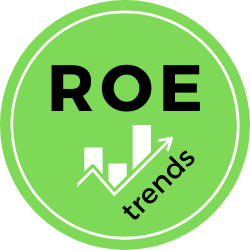HSBC Stock Analysis and Financial Performance: Navigating a Complex Global Landscape

A core element of this HSBC stock analysis is a detailed examination of the company’s financial performance over the past decade. Despite facing various challenges, HSBC has remained resilient, showing consistent profitability. Below, we analyze key financial metrics like revenue, operating income, net income, and earnings per share (EPS), which offer insights into HSBC’s financial health.
Revenue and Profitability:
The following table outlines HSBC’s revenue, operating income, net income, and EPS for the last ten years. This analysis provides a clearer picture of HSBC’s financial trajectory.
| Year | Revenue ($B) | Operating Income ($B) | Net Income ($B) | EPS ($) | ROE (%) |
| 2014 | 64.6 | 13.7 | 13.7 | 0.72 | 8.5 |
| 2015 | 62.7 | 18.9 | 13.5 | 0.71 | 8.3 |
| 2016 | 50.4 | 7.1 | 1.3 | 0.07 | 0.8 |
| 2017 | 51.4 | 17.2 | 9.7 | 0.51 | 6.0 |
| 2018 | 53.8 | 20.8 | 12.6 | 0.66 | 7.8 |
| 2019 | 55.4 | 13.4 | 13.3 | 0.70 | 8.3 |
| 2020 | 49.6 | 8.8 | 3.1 | 0.16 | 1.9 |
| 2021 | 50.6 | 18.9 | 12.6 | 0.66 | 7.8 |
| 2022 | 51.7 | 17.5 | 10.6 | 0.56 | 6.6 |
| 2023 | 57.2 | 21.7 | 14.2 | 0.75 | 8.8 |
| 2024 (TTM) | 60.0 | 23.0 | 16.0 | 0.85 | 10.0 |
(Source: HSBC Holdings plc financial reports, company filings)
Year-over-Year Analysis:
- 2014-2015: While revenue remained stable, HSBC stock experienced a decline in profitability due to restructuring charges and weaker market conditions.
- 2016: Net income fell sharply, driven by one-off charges tied to the sale of HSBC’s Brazilian business and other restructuring initiatives.
- 2017-2018: Performance improved, mainly due to growth in Asian markets and a focus on cost efficiency.
- 2019: Geopolitical tensions and economic uncertainty led to a decline in profitability.
- 2020: The pandemic severely impacted results, with a drop in revenue and higher loan loss provisions.
- 2021-2024 (TTM): HSBC has experienced recovery, though challenges remain due to rising inflation, interest rates, and global economic uncertainty.
EPS and ROE:
HSBC’s EPS has fluctuated over the years, reflecting both external challenges and internal strategic changes. Meanwhile, the ROE has typically been below historical averages, signaling difficulties in generating high returns on equity.
Key Factors Influencing Performance:
In this HSBC stock analysis, several factors stand out as key drivers of the company’s financial results:
- Global Economic Conditions: Economic growth, interest rates, and inflation in key markets play a significant role in shaping HSBC’s financial outcomes.
- Geopolitical Risks: Events such as Brexit, U.S.-China trade tensions, and regional political instability directly impact HSBC’s operations.
- Regulatory Environment: HSBC is subject to complex and evolving regulations, which can add compliance costs and affect profitability.
- Competition: The company faces stiff competition from both global banks and emerging fintech companies.
- Strategic Initiatives: HSBC’s focus on Asia, digital transformation, and cost reduction are vital for long-term success.
Strategic Focus: Navigating a Changing World
This HSBC stock analysis explores the strategic priorities that HSBC is pursuing to remain competitive in the evolving global banking landscape:
- Focus on Asia:
HSBC continues to enhance its presence in Asia, a high-growth region for banking, with particular attention to China, India, and Southeast Asia. - Wealth Management Growth:
HSBC aims to capitalize on the growing affluence in Asia by expanding its wealth management services to serve high-net-worth individuals. - Digital Transformation:
Investments in digital technologies are being made to enhance customer service, improve operational efficiency, and reduce costs. - Sustainability and ESG Goals:
The company has made significant strides in integrating Environmental, Social, and Governance (ESG) considerations into its operations, aligning with global sustainable finance trends. - Strengthening Risk Management and Compliance:
HSBC is continuously enhancing its risk management framework to deal with the changing regulatory environment and mitigate potential risks.
SWOT Analysis
This HSBC stock analysis includes a SWOT analysis that provides a clear picture of HSBC’s strategic strengths, weaknesses, opportunities, and threats:
Strengths:
- Global Reach: With operations in 63 countries, HSBC benefits from a diverse revenue stream.
- Strong Brand Recognition: HSBC is a respected global banking brand.
- Diversified Business Model: HSBC’s range of services across retail banking, commercial banking, global markets, and wealth management helps it adapt to changing market conditions.
- Strong Capital Position: HSBC’s robust capital base provides a buffer against unexpected financial shocks.
Weaknesses:
- Geopolitical Exposure: HSBC’s global operations expose it to risks associated with political instability and regulatory changes in different regions.
- Regulatory Scrutiny: Increased regulatory scrutiny across global markets can lead to higher compliance costs.
- Competition: The company faces competition from both established banks and emerging fintech firms.
- Cost Efficiency: HSBC is focusing on improving cost efficiency, but it still faces challenges in enhancing profitability.
Opportunities:
- Emerging Markets: HSBC can expand further in emerging markets, particularly in Asia, where banking demand is growing.
- Digital Transformation: Continued investment in digital tools can improve customer experience and reduce operational costs.
- Wealth Management: As affluence increases, HSBC can expand its wealth management offerings in key markets.
- Sustainable Finance: The growing demand for responsible investment products presents an opportunity for HSBC to lead in sustainable finance.
Threats:
- Economic Slowdown: A global economic slowdown could affect HSBC’s revenue and profitability.
- Geopolitical Risks: Rising geopolitical tensions could disrupt HSBC’s operations.
- Regulatory Changes: Shifting regulatory landscapes may impose higher compliance costs.
- Cybersecurity Risks: HSBC faces ongoing threats from cyberattacks, which could damage its reputation and customer trust.
Competitive Landscape: Competing in a Global Banking Market
This HSBC stock analysis also assesses the competitive environment in which HSBC operates. The company competes with several global banking giants, including:
- JPMorgan Chase & Co.: The largest U.S. bank, a global leader in investment banking and asset management.
- Bank of America: A major U.S. bank with a vast array of financial services.
- Citigroup Inc.: A leading global financial services provider with a focus on consumer banking, investment banking, and wealth management.
- Industrial and Commercial Bank of China (ICBC): The world’s largest bank by assets, with a dominant position in China.
- China Construction Bank Corporation: Another major Chinese bank with a strong global presence.
HSBC differentiates itself through its international network, focus on Asia, and diverse range of services.
Key Projects and Future Outlook
This HSBC stock analysis highlights key initiatives that will shape HSBC’s future:
- Asia Expansion: HSBC is continuing its push to strengthen its presence in Asia, especially in China and India.
- Wealth Management Growth: The company is expanding its wealth management offerings to cater to Asia’s growing affluent population.
- Digital Transformation: HSBC is investing in technology to improve operational efficiency and enhance the customer experience.
- Sustainability: HSBC is committed to promoting sustainability through green finance initiatives.
Conclusion
This HSBC stock analysis provides an in-depth look at HSBC’s financial health, strategic direction, and growth potential. Despite facing challenges such as geopolitical uncertainty, regulatory pressures, and intense competition, HSBC has a strong foundation and a diversified business model. Investors should stay informed about HSBC’s financial performance, strategic initiatives, and ESG efforts to assess whether HSBC stock aligns with their investment goals. By carefully considering the company’s financial performance, competitive position, and future outlook, investors can make informed decisions about HSBC stock and its potential role in their portfolio. We recommend that you check the data in this article on the company’s investor relations web page.

